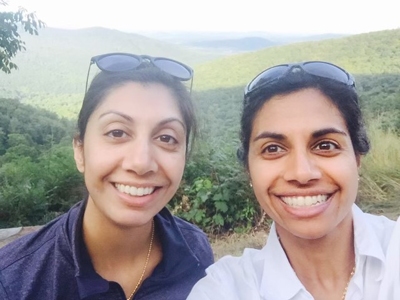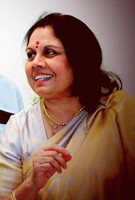 Sisters Nina and Shali Mohleji use philanthropy as a productive space to transform their pain and honor their mother, Manjula, who passed away five years ago from head and neck cancer. On the anniversary of her death, they each make a gift to the University of Maryland Medicine to support the research of Dr. Ranee Mehra, director of head and neck medical oncology and professor of medicine at the UM Marlene and Stewart Greenebaum Comprehensive Cancer Center.
Sisters Nina and Shali Mohleji use philanthropy as a productive space to transform their pain and honor their mother, Manjula, who passed away five years ago from head and neck cancer. On the anniversary of her death, they each make a gift to the University of Maryland Medicine to support the research of Dr. Ranee Mehra, director of head and neck medical oncology and professor of medicine at the UM Marlene and Stewart Greenebaum Comprehensive Cancer Center.
“We’re never going to forget our mother,” Shali said. “We’re always going to share memories of her, but this is a way—outside of our family—to keep her memory and legacy alive. In essence, we are channeling her spirit.”
Nina fondly recalls how her mother always ensured that family and friends were well cared for. “Her way of showing love was through feeding people. Even when she was unwell, she would always ask, ‘Have you eaten?’”
They shared that their gifts are mutually beneficial. “Her death was so horrific and painful; you just want to do something so other people won’t have to go through it,” Nina said. “I am happy to support Dr. Mehra’s research so she has the freedom and flexibility to scale or explore something and, at the same time, honor my mom.” She explained that head and neck cancer is a broad category. “There’s just so much left to understand.”
Dr. Mehra is incredibly grateful that the Mohlejis have chosen to support research efforts at the cancer center as they honor their mother. “We have much to learn about how to improve the treatment of head and neck cancer, and their generosity has given us the freedom to ask novel questions, which will hopefully help us improve the lives of future patients with this challenging disease,” Dr. Mehra shared.
What started as a seemingly minor and localized tumor on her tongue ultimately destroyed her whole body, Nina shared. “The first time it happened was terrifying because it’s that word: Cancer.” Over 20 years, discreet growths reappeared and were removed. Their mother never spoke about it, but she kept losing bits of her mouth and tongue. In 2017, the cancer returned aggressively and in more parts of her mouth and jaw.
As she approached the end of her battle, Manjula met Dr. Mehra. By then, she had consulted with many doctors and specialists outside the University of Maryland Medical System. However, it was with Dr. Mehra that Manjula and her entire family formed a strong bond that endures.
 Shali and Nina credit Dr. Mehra’s expertise and compassion for that bond. Dr. Mehra gave their mother the space to acknowledge and embrace the difficulty associated with her diagnosis. “To have a doctor who was so empathetic and compassionate, who understood and got to know my mom as a person, and who understood her experience— not just as an illness—was incredible,” Nina said. “Dr. Mehra can provide comfort during the most uncomfortable experience of life. Our mom was so grateful that she was there to help take care of our family, too.”
Shali and Nina credit Dr. Mehra’s expertise and compassion for that bond. Dr. Mehra gave their mother the space to acknowledge and embrace the difficulty associated with her diagnosis. “To have a doctor who was so empathetic and compassionate, who understood and got to know my mom as a person, and who understood her experience— not just as an illness—was incredible,” Nina said. “Dr. Mehra can provide comfort during the most uncomfortable experience of life. Our mom was so grateful that she was there to help take care of our family, too.”
Dr. Mehra connected Manjula to any remaining options, ultimately proving powerless against Nina and Shali Mohleji celebrate their mother’s legacy by supporting head and neck cancer research eradicating the cancer. “We knew our mom was getting excellent care,” Shali said. “But at a certain point, you recognize the gravity of what’s coming, and it becomes a journey of accepting the reality of what’s happening. There’s nothing you can do to make it better. That’s a hard pill to swallow.”
Cancer management is not easy, Nina shared. “It is painful. It is difficult. It is disruptive. It takes over your entire life. You can’t remove yourself from it by saying, ‘Okay, that’s my personal life.’ It’s in your brain when you’re at work. It affects everyone you know that’s in your life. It’s a complicated reality to deal with day after day.”
Despite their ongoing generosity, Nina and Shali find it hard to think of themselves as philanthropists because they are not donating millions of dollars. “We’re providing what’s in our means.” They are deeply moved by the gratitude Dr. Mehra and her staff have expressed for their contributions and find comfort in knowing that their gifts are having a positive impact while honoring their mother’s memory.